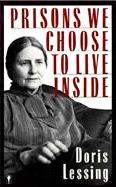Originally posted on sciy.org by Debashish Banerji on Sat 10 Jan 2009 09:26 AM PST
Prisons We Choose To Live Inside
 Prisons We Choose To Live Inside
Prisons We Choose To Live InsideAnansi , 1991, c1986.
I recently came across an exciting, short book by the well-regarded novelist and social commentator, Doris Lessing; Prisons We Choose to Live Inside. This book is one you just want to buy in bulk and hand out to everyone you know. Its’ message is clear, easy to read, and extremely important.
The author discusses the vast amount of knowledge gained right after WWII and The Korean War in areas of human behavior. Germany’s terrible human rights violations provided a payload of data on human behavior for scientists to mine, and propelled research into this area as nothing else had ever done. The conflict in Korea brought more questions and answering them lead to quantifiable data about techniques of manipulation, brainwashing, and the dynamics of group behavior and control. Research showed that our “civilized mind†is a very thin veneer over very base instincts -- to succeed and survive, to become aroused and view others as inferior or evil, to maim and to kill. Once these base instincts are aroused, the newer “civilized†part of our brains just disengages, allowing the primitive brain free reign. Via this research, we became not only able to predict the reactions of individuals and groups under high stress, but in almost any situation. This research had (and has) widespread implications for all of us.
The dynamics of group pressure leading to “group think†are as old as humankind, but proper understanding of how those dynamics often work against us could help us maintain the freedom of choice we so highly value. Ms. Lessing specifically notes how this vast store of knowledge is still not being used, except by those who seek to manipulate others for their own ends; “professionals†in the military or policing agencies, advertising agencies, religious leaders and politicians. She notes, “The first thing a political candidate does is hire a public relations firm.†Speechwriters are necessary, people who understand how to excite our passions. They can create a hero when none exists, make us feel proud, safe or fearful, or ignite in us a thirst for revenge.
I find this especially interesting because Doris. Lessing published this book in 1987. The years since are filled with examples of this power. We have corporate cultures where normally honest people keep silent about, or participate in, criminal activity that harms thousands. Polluters whose employees keep silent while our environment is being poisoned. Politicians tell us “God is on our sideâ€, and other people or nations, with different views, are not just wrong; they are against us or worse, evil. Most of us are still vulnerable to these techniques because we are unaware of how they operate, even though this knowledge has been available for forty years. The author specifically noted that future generations will no doubt be quite mystified about the disparity between what we knew and what we put to use.
There is a general consensus in science and medicine that most new discoveries take at least twenty years to become commonly known and widely accepted. Scientific studies demonstrating the harmful effects of tobacco preceded general acceptance by forty years, fought all the way by special interests and smokers. Our food pyramid was reconfigured more than twenty years after experts reported that such high carbohydrate consumption was a likely cause of obesity that precipitated illness.
As troubling as the normal curve of dispersion may be, Ms Lessing predicted that the specific behavioral knowledge she was writing about would not (perhaps ever) become part of our educational system or widely disseminated to the general public. Although it holds tremendous value for safeguarding our freedoms and our ability to freely choose in matters great and small, she stated that those who seek to use this knowledge to further their own causes would not want us to be able to identify the strategies through which we are being manipulated. The ensuing years have shown this to be true.
We must attempt to discern the truth as best we can. Understanding the pressures brought to bear on us by our group affiliations, be they familial, cultural, religious, political or national, is necessary if we are to even approach objectivity. We may decide we agree with group ideals, and freely choose to accept them, but the point is we should know we have a choice. Once we understand the dynamics of groups, we can better prepare ourselves, and our children, for what to expect in various situations. This ability has universal implications.
We wonder how some world leaders get their followers to do the most horrible, inhumane things; unspeakable brutality, genocide, suicide bombings. We wonder because we have not learned and understood the science of human behavior and how behavior can be shaped. We are being shaped and changed too, but we are as unaware of it as others. Becoming aware is the first step in change. Once aware, we can rationally choose; “ to go along†or to speak out, choose to follow our own conscience, to offer alternative action, to understand the mind-set of the “otherâ€. The future of our families, our nation, our world, depend upon a population that understands and resists the easy avenue of conformity. Democracy, the ideals of freedom, is trampled when those who question our leaders are accused of lacking patriotism. What are we about, if not the freedom to question and debate the merits of the issues? What are we fighting to keep, if not freedom of thought and speech? We must protect this freedom for ourselves and respect it in others. We must educate ourselves, step outside the box. Examine issues from a different, more objective perspective, and then make choices based on informed consent. In other words, read the book.Attachment:







